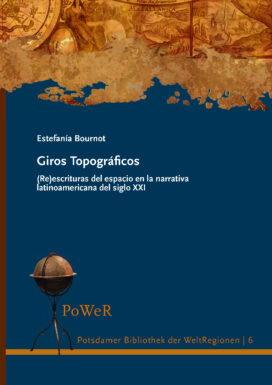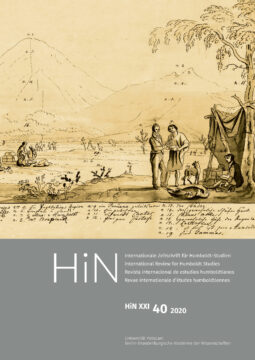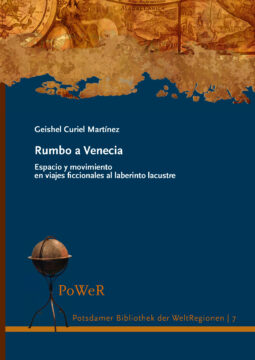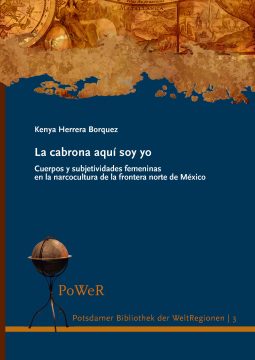Topographic turns investigates the symbolic productions of space in a series of narrative texts published since the turn of the millennium in Latin America. Drawing on theoretical approaches of the Spatial Turn and Geocriticism, the study critically examines literary topographies from four angles that exceed and transform territorial and national boundaries: dynamics of mediatic hyperconnectivity and accelerated mobility; affective genealogies; urban ecologies; and representations of otherness.
Based on the analysis of works by Lina Meruane, Guillermo Fadanelli, Andrés Neuman, Andrea Jeftanovic, Sergio Chejfech and Bernardo Carvalho, among others, the book outlines the flows, ambiguities and tensions projected by the imagined communities of the 21st century. Overall the study seeks to offer a contribution to rethink the status of Latin American literature in the context of its advanced globalization and the consequent consolidation of translocalized spaces of enunciation.
(Re)escrituras del espacio en la narrativa latinoamericana del siglo XX
ISBN: 978-3-86956-534-7
192 pages, Paperback
Release year 2022
Series: Potsdamer Bibliothek der WeltRegionen , 6
11,50 €
Non-taxable transaction according to § 1 (1) UStG/VAT Act in combination with § 2 (3) UStG/VAT Act a. F. Providing this service, the University of Potsdam does not constitute a Betrieb gewerblicher Art/Commercial Institution according to § 1 (1) No. 6 or § 4 KStG/Corporate Tax Act. If the legal characterization of our business is changed to a commercial institution subsequently, we reserve the right to invoice VAT additionally. zzgl. Versandkosten
Topographic turns investigates the symbolic productions of space in a series of narrative texts published since the turn of the millennium in Latin America. Drawing on theoretical approaches of the Spatial Turn and Geocriticism, the study critically examines literary topographies from four angles that exceed and transform territorial and national boundaries: dynamics of mediatic hyperconnectivity and accelerated mobility; affective genealogies; urban ecologies; and representations of otherness.
Based on the analysis of works by Lina Meruane, Guillermo Fadanelli, Andrés Neuman, Andrea Jeftanovic, Sergio Chejfech and Bernardo Carvalho, among others, the book outlines the flows, ambiguities and tensions projected by the imagined communities of the 21st century. Overall the study seeks to offer a contribution to rethink the status of Latin American literature in the context of its advanced globalization and the consequent consolidation of translocalized spaces of enunciation.
Recommended Books
-
 2020
2020Cándido Manuel García Cruz, Eberhard Knobloch, Heinz Krumpel, Ingrid Männl, Ulrich Päßler, Christina Pinsdorf, Marcus Schladebach
Alexander von Humboldt im Netz ; 21 (2020) 40
19,50 €Non-taxable transaction according to § 1 (1) UStG/VAT Act in combination with § 2 (3) UStG/VAT Act a. F. Providing this service, the University of Potsdam does not constitute a Betrieb gewerblicher Art/Commercial Institution according to § 1 (1) No. 6 or § 4 KStG/Corporate Tax Act. If the legal characterization of our business is changed to a commercial institution subsequently, we reserve the right to invoice VAT additionally.
zzgl. Versandkosten
Add to cart -
 2024
2024Rumbo a Venecia
14,50 €Non-taxable transaction according to § 1 (1) UStG/VAT Act in combination with § 2 (3) UStG/VAT Act a. F. Providing this service, the University of Potsdam does not constitute a Betrieb gewerblicher Art/Commercial Institution according to § 1 (1) No. 6 or § 4 KStG/Corporate Tax Act. If the legal characterization of our business is changed to a commercial institution subsequently, we reserve the right to invoice VAT additionally.
zzgl. Versandkosten
Add to cart -
 2019
2019Ficción herética
10,00 €Non-taxable transaction according to § 1 (1) UStG/VAT Act in combination with § 2 (3) UStG/VAT Act a. F. Providing this service, the University of Potsdam does not constitute a Betrieb gewerblicher Art/Commercial Institution according to § 1 (1) No. 6 or § 4 KStG/Corporate Tax Act. If the legal characterization of our business is changed to a commercial institution subsequently, we reserve the right to invoice VAT additionally.
zzgl. Versandkosten
Add to cart -
 2019
2019La cabrona aqui soy yo
11,50 €Non-taxable transaction according to § 1 (1) UStG/VAT Act in combination with § 2 (3) UStG/VAT Act a. F. Providing this service, the University of Potsdam does not constitute a Betrieb gewerblicher Art/Commercial Institution according to § 1 (1) No. 6 or § 4 KStG/Corporate Tax Act. If the legal characterization of our business is changed to a commercial institution subsequently, we reserve the right to invoice VAT additionally.
zzgl. Versandkosten
Add to cart
Contact
Potsdam University Library
University Press
Am Neuen Palais 10
14476 Potsdam
Germany
verlag@uni-potsdam.de
0331 977-2094
0331 977-2292





